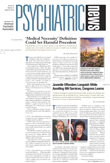What happens when children experience a traumatic event—say, a serious accident, a serious illness, a fire, or a rape? Are they more likely to develop a major depression or posttraumatic stress disorder (PTSD)? They are more likely to develop the former.
And how about adolescents who experience a very traumatic event? They are more likely to develop PTSD.
So suggests a study conducted in eastern Germany and headed by Andreas Maercker, M.D., Ph.D., a professor of clinical psychology at the University of Zurich in Switzerland. The results appeared in the June British Journal of Psychiatry.
Maercker and his colleagues based their study on 1,966 women, average age 22 years, who lived in Dresden, Germany. The subjects were questioned about traumatic events and their responses during both childhood and adolescence, as well as whether they had experienced a major depression during childhood or adolescence. The assessment was carried out using the Diagnostiches Interview bei psychischen Storungen-Forschungsversion. It is a modified version of the Anxiety Disorder Interview Schedule for DSM-IV-Lifetime version.
Of the 1,966 subjects, 498 had experienced a traumatic event during either childhood or adolescence. Of those 498 subjects, 210 had experienced a trauma at age 12 years or younger (defined as children), and 288 after age 13 (defined as adolescents).
In the child trauma group, 41 (23 percent) had experienced a major depression, and 30 (17 percent) had experienced posttraumatic stress disorder. In the adolescent trauma group, 16 (7 percent) had experienced a major depression, and 33 (13 percent) had experienced posttraumatic stress disorder.
“We were able to show that experiencing a traumatic event in childhood (up to age 12 years) is related to higher rates of major depression than is experiencing a traumatic event in adolescence (after age 13 years),” the researchers observed in their report. “This age-related difference could not be found for posttraumatic stress disorder. In other words, there is a higher probability of developing major depressive disorder if a trauma is suffered during childhood than if the trauma occurs in adolescence.”
Maercker told Psychiatric News, “The main result—the high prevalence of major depression in children—surprised me.”
Why might traumatized children be more likely to experience a major depression rather than posttraumatic stress disorder? Perhaps because their brains are not yet developed enough to experience posttraumatic stress disorder. “We assume that development of posttraumatic stress disorder requires a certain maturation of memory organization and arousal modulation, which is not achieved before adolescence,” the researchers explained in their report.
Two limitations of the study were that it was conducted only on women and that it was conducted retrospectively and might therefore be open to recall bias. Nonetheless, a 1991 study produced similar results—after a disaster, fewer posttraumatic stress disorder symptoms were found in children than in adolescents.
Br J Psychiatry 2004 184 482
